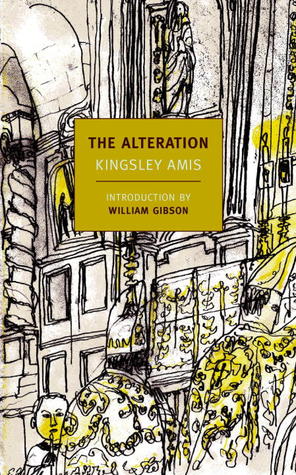It’s 1976, and the rule of the Roman Catholic Church is absolute. A stable theocracy prevails across Europe. The Reformation never happened. A papal crusade prevented Henry VIII from taking the throne. Martin Luther became Pope Germanian I. The Church is in charge of all aspects of life, from government and culture all the way down to personal relationships.
Ten year old Hubert Anvil is an incredibly gifted soprano, but as puberty approaches, his voice will break, inevitably destroying his ability to sing in the higher registers. Hubert’s superiors are considering an “alteration”: removing the offending parts of his anatomy before hormones ravage his angelical voice….
The Alteration is a 1976 alternate history novel by English novelist, poet and critic Kingsley Amis. It won the John W. Campbell Memorial Award for Best Novel. This new edition, out on May 7th from NYRB Classics, also features an insightful new introduction by William Gibson.
The world portrayed in The Alteration by Kingsley Amis is a meticulously constructed and plausible dystopia that accounts in large part for the fascination this novel still holds. The Catholic Church has controlled life for so long and in such a complete way that most characters take it more or less for granted. The novel’s title is very effective in the way it implies multiple meanings: not just Hubert’s proposed castration, but also the larger alteration of history.
Amis mentions many of these historical changes in passing or simply implies them, which may make it tricky for readers who aren’t very familiar with (real) history to fully appreciate some of the many clever references. Just the first few pages contain a list of visiting dignitaries whose titles imply a completely different history of Europe (no unified Italy, for one) and vastly different roles for some historical figures (as evidenced by the last names of Monsignors Henricus and Lavrentius). You don’t have to be a historian to appreciate this novel, but as William Gibson indicates in his introduction, a basic familiarity with the concepts of the Reformation is probably helpful.
In the world of The Alteration, science has literally become a dirty word. Progress has more or less been stopped for a few centuries. Electricity is unknown after having been banned. As a result, vehicles run on Diesel engines (which don’t require an electrical spark for ignition) and intercontinental travel by steam train is common. At least in terms of technology, there’s something steampunk-like about this novel.
Another consequence of the Church’s opposition to scientific progress is that science fiction has become forbidden literature. There’s an underground circuit for people who enjoy TR, or Time Romance, as the genre is known in this reality. The most controversial of TR’s subgenres is dubbed CW, Counterfeit World, which imagines worlds and histories different from the one portrayed in the novel, such as Philip K. Dick’s The Man in the High Castle—an alternate history that exists inside this alternate history and portrays a world in which the events that led up to the reality portrayed in The Alteration never happened. Other genre classics have been changed to fit into the Church’s proscribed worldview, such as Lord of the Chalices and The Wind in the Cloisters.
For me, The Alteration is at its best when it explores its setting and its premise by showing both subtle and overt changes to established history. Finding the references to real history is somehow both exhilarating (at least for history geeks like me) and utterly depressing (in all its implications). In terms of plot and characters, the novel is not the author’s best work, but like William Gibson in his introduction I’d rather not go into too much detail here, so you can approach the story without preconceived notions.
The Alteration is both an interesting take on alternate history and a broad indictment of the way religious dogmatism can impact people on the most personal, intimate level as well as on a society-wide scale. If you’re a fan of alternate history, definitely check out what Gibson calls this “most admirably foul counterfeit world.”
Stefan Raets reads and reviews science fiction and fantasy whenever he isn’t distracted by less important things like eating and sleeping. You can find him on Twitter, and his website is Far Beyond Reality.










